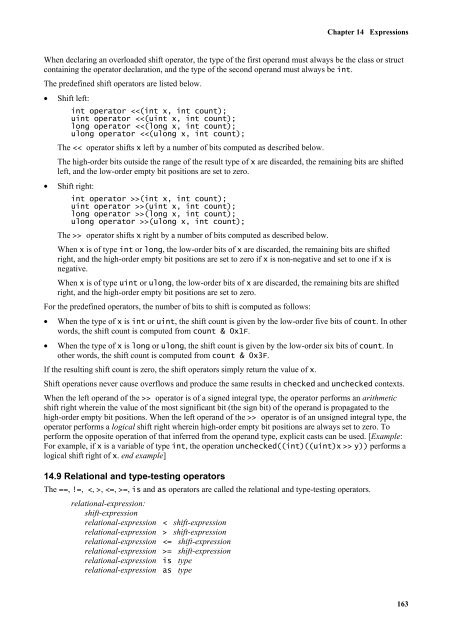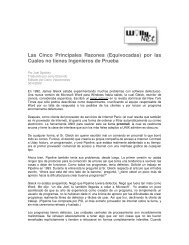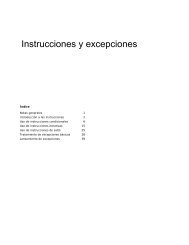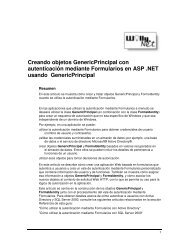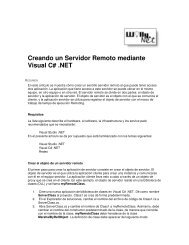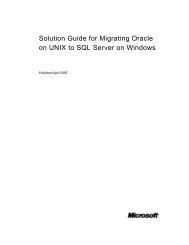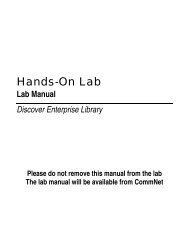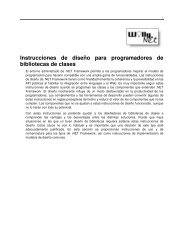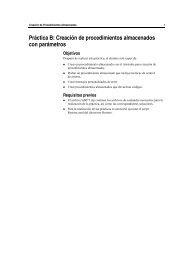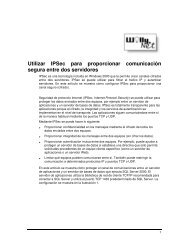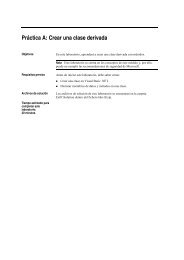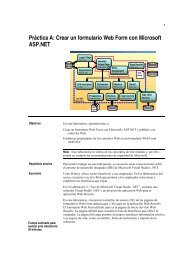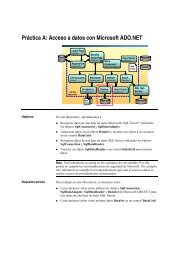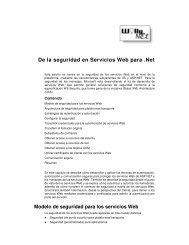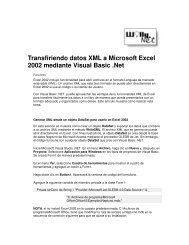- Page 1:
Standard ECMA-3342nd edition - Dece
- Page 5:
Brief historyThis International Sta
- Page 8:
C# LANGUAGE SPECIFICATION9.3.3 Whit
- Page 13 and 14:
Table of Contents18.3.5 Boxing and
- Page 15 and 16:
Table of ContentsA.2.12 Attributes.
- Page 17:
Chapter 1 Scope1. ScopeThis clause
- Page 20 and 21:
C# LANGUAGE SPECIFICATIONA conformi
- Page 23 and 24:
Chapter 4 Definitions4. Definitions
- Page 25 and 26:
Chapter 5 Notational conventions5.
- Page 29:
Chapter 7 General description7. Gen
- Page 32 and 33:
C# LANGUAGE SPECIFICATION• The pr
- Page 34 and 35:
C# LANGUAGE SPECIFICATIONresults in
- Page 36 and 37:
C# LANGUAGE SPECIFICATION8.2.3 Arra
- Page 38 and 39:
C# LANGUAGE SPECIFICATIONclass Test
- Page 40 and 41:
C# LANGUAGE SPECIFICATIONpre: x = 1
- Page 42 and 43:
C# LANGUAGE SPECIFICATION}public vo
- Page 44 and 45:
C# LANGUAGE SPECIFICATIONPrecedence
- Page 46 and 47:
C# LANGUAGE SPECIFICATIONdo stateme
- Page 48 and 49:
C# LANGUAGE SPECIFICATION}}set {MyF
- Page 50 and 51:
C# LANGUAGE SPECIFICATION}public st
- Page 52 and 53:
C# LANGUAGE SPECIFICATIONButton b =
- Page 54 and 55:
C# LANGUAGE SPECIFICATIONclass Test
- Page 56 and 57:
C# LANGUAGE SPECIFICATIONThe exampl
- Page 58 and 59:
C# LANGUAGE SPECIFICATIONstructs ar
- Page 60 and 61:
C# LANGUAGE SPECIFICATIONAn interes
- Page 62 and 63:
C# LANGUAGE SPECIFICATIONThe next s
- Page 64 and 65:
C# LANGUAGE SPECIFICATION// Author
- Page 67 and 68:
Chapter 9 Lexical structure9. Lexic
- Page 69 and 70:
Chapter 9 Lexical structure9.3.2 Co
- Page 71 and 72:
Chapter 9 Lexical structureclass Cl
- Page 73 and 74:
Chapter 9 Lexical structurekeyword:
- Page 75 and 76:
Chapter 9 Lexical structurereal-typ
- Page 77 and 78:
Chapter 9 Lexical structureverbatim
- Page 79 and 80:
Chapter 9 Lexical structure#if Bvoi
- Page 81 and 82:
Chapter 9 Lexical structure#define
- Page 83 and 84:
Chapter 9 Lexical structureclass He
- Page 85 and 86:
Chapter 10 Basic concepts10. Basic
- Page 87 and 88:
Chapter 10 Basic concepts• Each b
- Page 89 and 90:
Chapter 10 Basic concepts• The me
- Page 91 and 92:
Chapter 10 Basic concepts• If the
- Page 93 and 94:
Chapter 10 Basic concepts10.5.3 Pro
- Page 95 and 96:
Chapter 10 Basic conceptsdeclared i
- Page 97 and 98:
Chapter 10 Basic conceptsIn the F m
- Page 99 and 100:
Chapter 10 Basic conceptsclass Deri
- Page 101 and 102:
Chapter 10 Basic conceptsnamespace
- Page 103:
Chapter 10 Basic concepts}}// A and
- Page 106 and 107:
C# LANGUAGE SPECIFICATIONfloating-p
- Page 108 and 109:
C# LANGUAGE SPECIFICATION• The by
- Page 110 and 111:
C# LANGUAGE SPECIFICATION11.1.6 The
- Page 112 and 113:
C# LANGUAGE SPECIFICATION11.2.4 Int
- Page 115 and 116:
Chapter 12 Variables12. VariablesVa
- Page 117 and 118:
Chapter 12 Variables• Following t
- Page 119 and 120:
Chapter 12 Variables• Static vari
- Page 121 and 122:
Chapter 12 Variables12.3.3.6 Switch
- Page 123 and 124:
Chapter 12 Variables• The definit
- Page 125 and 126:
Chapter 12 Variablesassignment expr
- Page 127 and 128: Chapter 12 Variableso Otherwise, if
- Page 129 and 130: Chapter 13 Conversions13. Conversio
- Page 131 and 132: Chapter 13 Conversions• A constan
- Page 133 and 134: Chapter 13 Conversions13.2.2 Explic
- Page 135 and 136: Chapter 13 Conversions13.4.2 Evalua
- Page 137: Chapter 13 Conversionsthen the conv
- Page 140 and 141: C# LANGUAGE SPECIFICATION14.1.1 Val
- Page 142 and 143: C# LANGUAGE SPECIFICATIONThe overlo
- Page 144 and 145: C# LANGUAGE SPECIFICATIONWhen overl
- Page 146 and 147: C# LANGUAGE SPECIFICATION14.4 Funct
- Page 148 and 149: C# LANGUAGE SPECIFICATIONConstruct
- Page 150 and 151: C# LANGUAGE SPECIFICATIONWhen a fun
- Page 152 and 153: C# LANGUAGE SPECIFICATION• If T 2
- Page 154 and 155: C# LANGUAGE SPECIFICATIONobject o =
- Page 156 and 157: C# LANGUAGE SPECIFICATION14.5.4 Mem
- Page 158 and 159: C# LANGUAGE SPECIFICATIONThe primar
- Page 160 and 161: C# LANGUAGE SPECIFICATION• The va
- Page 162 and 163: C# LANGUAGE SPECIFICATIONUnary oper
- Page 164 and 165: C# LANGUAGE SPECIFICATIONnonnegativ
- Page 166 and 167: C# LANGUAGE SPECIFICATIONThe new de
- Page 168 and 169: C# LANGUAGE SPECIFICATIONFor non-co
- Page 170 and 171: C# LANGUAGE SPECIFICATION14.6.2 Una
- Page 172 and 173: C# LANGUAGE SPECIFICATIONThe gramma
- Page 174 and 175: C# LANGUAGE SPECIFICATIONand y are
- Page 176 and 177: C# LANGUAGE SPECIFICATIONy +0 -0 +
- Page 180 and 181: C# LANGUAGE SPECIFICATIONequality-e
- Page 182 and 183: C# LANGUAGE SPECIFICATIONThe result
- Page 184 and 185: C# LANGUAGE SPECIFICATION• If eit
- Page 186 and 187: C# LANGUAGE SPECIFICATIONwords, the
- Page 188 and 189: C# LANGUAGE SPECIFICATION• If X a
- Page 190 and 191: C# LANGUAGE SPECIFICATION}public in
- Page 192 and 193: C# LANGUAGE SPECIFICATION• Parent
- Page 194 and 195: C# LANGUAGE SPECIFICATIONthe second
- Page 196 and 197: C# LANGUAGE SPECIFICATIONvoid Proce
- Page 198 and 199: C# LANGUAGE SPECIFICATIONThe type a
- Page 200 and 201: C# LANGUAGE SPECIFICATIONenclosed i
- Page 202 and 203: C# LANGUAGE SPECIFICATIONvoid DoCom
- Page 204 and 205: C# LANGUAGE SPECIFICATIONfor-initia
- Page 206 and 207: C# LANGUAGE SPECIFICATIONIEnumerato
- Page 208 and 209: C# LANGUAGE SPECIFICATION15.9.2 The
- Page 210 and 211: C# LANGUAGE SPECIFICATION• If the
- Page 212 and 213: C# LANGUAGE SPECIFICATIONWithin a c
- Page 214 and 215: C# LANGUAGE SPECIFICATION15.12 The
- Page 216 and 217: C# LANGUAGE SPECIFICATION}}using (T
- Page 218 and 219: C# LANGUAGE SPECIFICATIONA namespac
- Page 220 and 221: C# LANGUAGE SPECIFICATIONAbove, N3
- Page 222 and 223: C# LANGUAGE SPECIFICATIONthe using-
- Page 225 and 226: Chapter 17 Classes17. ClassesA clas
- Page 227 and 228: Chapter 17 ClassesThe direct base c
- Page 229 and 230:
Chapter 17 Classesthe same class, a
- Page 231 and 232:
Chapter 17 Classes(§14.5.4), insta
- Page 233 and 234:
Chapter 17 Classesshows this techni
- Page 235 and 236:
Chapter 17 Classes17.2.7.2 Member N
- Page 237 and 238:
Chapter 17 Classesfield-modifier:ne
- Page 239 and 240:
Chapter 17 Classesusing System;name
- Page 241 and 242:
Chapter 17 Classes}static void Main
- Page 243 and 244:
Chapter 17 Classesthe variable init
- Page 245 and 246:
Chapter 17 ClassesA method invocati
- Page 247 and 248:
Chapter 17 Classes17.5.1.4 Paramete
- Page 249 and 250:
Chapter 17 ClassesSystem.Int32 Syst
- Page 251 and 252:
Chapter 17 Classesclass Test{static
- Page 253 and 254:
Chapter 17 Classes}public virtual v
- Page 255 and 256:
Chapter 17 Classes17.5.8 Method bod
- Page 257 and 258:
Chapter 17 Classesaccessor-declarat
- Page 259 and 260:
Chapter 17 Classesthe P property in
- Page 261 and 262:
Chapter 17 ClassesThe Console class
- Page 263 and 264:
Chapter 17 Classesremove-accessor-d
- Page 265 and 266:
Chapter 17 Classes}public event D E
- Page 267 and 268:
Chapter 17 ClassesAn event declarat
- Page 269 and 270:
Chapter 17 Classes}public BitArray(
- Page 271 and 272:
Chapter 17 Classesbinary-operator-d
- Page 273 and 274:
Chapter 17 ClassesA conversion oper
- Page 275 and 276:
Chapter 17 Classes17.10.1 Construct
- Page 277 and 278:
Chapter 17 Classesclass A{int x, y,
- Page 279 and 280:
Chapter 17 ClassesThe identifier of
- Page 281:
Chapter 17 Classesisusing System;cl
- Page 284 and 285:
C# LANGUAGE SPECIFICATIONInterface
- Page 286 and 287:
C# LANGUAGE SPECIFICATION}public Ke
- Page 288 and 289:
C# LANGUAGE SPECIFICATION18.4.1 Dat
- Page 290 and 291:
C# LANGUAGE SPECIFICATION}public st
- Page 292 and 293:
C# LANGUAGE SPECIFICATION19.1.1 The
- Page 294 and 295:
C# LANGUAGE SPECIFICATIONint[,] b =
- Page 296 and 297:
C# LANGUAGE SPECIFICATIONIt is a co
- Page 298 and 299:
C# LANGUAGE SPECIFICATION20.2.3 Int
- Page 300 and 301:
C# LANGUAGE SPECIFICATIONinterface
- Page 302 and 303:
C# LANGUAGE SPECIFICATIONparticular
- Page 304 and 305:
C# LANGUAGE SPECIFICATIONIf a class
- Page 306 and 307:
C# LANGUAGE SPECIFICATIONclass Text
- Page 308 and 309:
C# LANGUAGE SPECIFICATIONabstract c
- Page 310 and 311:
C# LANGUAGE SPECIFICATIONenum-modif
- Page 312 and 313:
C# LANGUAGE SPECIFICATIONEnum membe
- Page 314 and 315:
C# LANGUAGE SPECIFICATIONdelegate i
- Page 316 and 317:
C# LANGUAGE SPECIFICATIONusing Syst
- Page 319 and 320:
Chapter 23 Exceptions23. Exceptions
- Page 321 and 322:
Chapter 24 Attributes24. Attributes
- Page 323 and 324:
Chapter 24 Attributesend example][H
- Page 325 and 326:
Chapter 24 Attributesaffirm the def
- Page 327 and 328:
Chapter 24 Attributesusing System;[
- Page 329 and 330:
Chapter 24 Attributesusing System;u
- Page 331:
Chapter 24 Attributes[Example: In t
- Page 334 and 335:
C# LANGUAGE SPECIFICATIONinterface-
- Page 336 and 337:
C# LANGUAGE SPECIFICATIONunmanaged-
- Page 338 and 339:
C# LANGUAGE SPECIFICATION• The st
- Page 340 and 341:
C# LANGUAGE SPECIFICATION25.5.1 Poi
- Page 342 and 343:
C# LANGUAGE SPECIFICATIONcompile-ti
- Page 344 and 345:
C# LANGUAGE SPECIFICATIONThe result
- Page 346 and 347:
C# LANGUAGE SPECIFICATIONThe third
- Page 348 and 349:
C# LANGUAGE SPECIFICATION[Example:
- Page 350 and 351:
C# LANGUAGE SPECIFICATIONThe exampl
- Page 352 and 353:
C# LANGUAGE SPECIFICATIONinput-char
- Page 354 and 355:
C# LANGUAGE SPECIFICATIONA.1.8 Lite
- Page 356 and 357:
C# LANGUAGE SPECIFICATIONA.1.10 Pre
- Page 358 and 359:
C# LANGUAGE SPECIFICATION342type-na
- Page 360 and 361:
C# LANGUAGE SPECIFICATIONmember-acc
- Page 362 and 363:
C# LANGUAGE SPECIFICATIONassignment
- Page 364 and 365:
C# LANGUAGE SPECIFICATIONwhile-stat
- Page 366 and 367:
C# LANGUAGE SPECIFICATIONA.2.6 Clas
- Page 368 and 369:
C# LANGUAGE SPECIFICATIONmember-nam
- Page 370 and 371:
C# LANGUAGE SPECIFICATIONoperator-m
- Page 372 and 373:
C# LANGUAGE SPECIFICATIONrank-speci
- Page 374 and 375:
C# LANGUAGE SPECIFICATIONA.2.12 Att
- Page 376 and 377:
C# LANGUAGE SPECIFICATIONfixed-poin
- Page 378 and 379:
C# LANGUAGE SPECIFICATION10. The re
- Page 380 and 381:
C# LANGUAGE SPECIFICATIONType Case
- Page 382 and 383:
C# LANGUAGE SPECIFICATION[Flags]pub
- Page 384 and 385:
C# LANGUAGE SPECIFICATIONSystem.Win
- Page 386 and 387:
C# LANGUAGE SPECIFICATION{}public A
- Page 388 and 389:
C# LANGUAGE SPECIFICATION}// Namesp
- Page 390 and 391:
C# LANGUAGE SPECIFICATION}public ov
- Page 392 and 393:
C# LANGUAGE SPECIFICATION}public st
- Page 394 and 395:
C# LANGUAGE SPECIFICATIONpublic sta
- Page 396 and 397:
C# LANGUAGE SPECIFICATIONpublic sta
- Page 398 and 399:
C# LANGUAGE SPECIFICATIONpublic sta
- Page 400 and 401:
C# LANGUAGE SPECIFICATION}public st
- Page 402 and 403:
C# LANGUAGE SPECIFICATION}public st
- Page 404 and 405:
C# LANGUAGE SPECIFICATION}public st
- Page 406 and 407:
C# LANGUAGE SPECIFICATION{}public D
- Page 408 and 409:
C# LANGUAGE SPECIFICATION}public ab
- Page 410 and 411:
C# LANGUAGE SPECIFICATIONpublic sea
- Page 412 and 413:
C# LANGUAGE SPECIFICATION}// Namesp
- Page 414 and 415:
C# LANGUAGE SPECIFICATION}protected
- Page 416 and 417:
C# LANGUAGE SPECIFICATION}// Namesp
- Page 418 and 419:
C# LANGUAGE SPECIFICATION}// Namesp
- Page 420 and 421:
C# LANGUAGE SPECIFICATION}comparand
- Page 422 and 423:
C# LANGUAGE SPECIFICATION}public st
- Page 424 and 425:
C# LANGUAGE SPECIFICATION}public No
- Page 426 and 427:
C# LANGUAGE SPECIFICATION// Namespa
- Page 428 and 429:
C# LANGUAGE SPECIFICATION}public vi
- Page 430 and 431:
C# LANGUAGE SPECIFICATION// Namespa
- Page 432 and 433:
C# LANGUAGE SPECIFICATION}public vi
- Page 434 and 435:
C# LANGUAGE SPECIFICATIONpublic sta
- Page 436 and 437:
C# LANGUAGE SPECIFICATIONpublic Str
- Page 438 and 439:
C# LANGUAGE SPECIFICATION}public ov
- Page 440 and 441:
C# LANGUAGE SPECIFICATION}// Namesp
- Page 442 and 443:
C# LANGUAGE SPECIFICATION{}public c
- Page 444 and 445:
C# LANGUAGE SPECIFICATION}public bo
- Page 446 and 447:
C# LANGUAGE SPECIFICATION}Enclosing
- Page 448 and 449:
C# LANGUAGE SPECIFICATION}public Ve
- Page 450 and 451:
C# LANGUAGE SPECIFICATIONAlthough d
- Page 452 and 453:
C# LANGUAGE SPECIFICATIONpublic cla
- Page 454 and 455:
C# LANGUAGE SPECIFICATION/// This c
- Page 456 and 457:
C# LANGUAGE SPECIFICATIONE.2.14 Thi
- Page 458 and 459:
C# LANGUAGE SPECIFICATION"T:Color""
- Page 460 and 461:
C# LANGUAGE SPECIFICATIONnamespace
- Page 462 and 463:
C# LANGUAGE SPECIFICATION}if (GetTy
- Page 464 and 465:
C# LANGUAGE SPECIFICATIONThis metho
- Page 466 and 467:
C# LANGUAGE SPECIFICATION< 163> ...
- Page 468 and 469:
C# LANGUAGE SPECIFICATIONevent.....
- Page 470 and 471:
C# LANGUAGE SPECIFICATIONdestructor
- Page 472 and 473:
C# LANGUAGE SPECIFICATIONinvocation
- Page 474 and 475:
C# LANGUAGE SPECIFICATIONextensions
- Page 476 and 477:
C# LANGUAGE SPECIFICATIONdeclaratio
- Page 478 and 479:
C# LANGUAGE SPECIFICATIONNaN ......
- Page 480 and 481:
C# LANGUAGE SPECIFICATIONshift ....
- Page 482 and 483:
C# LANGUAGE SPECIFICATIONpunctuator
- Page 484 and 485:
C# LANGUAGE SPECIFICATIONstring as.
- Page 486 and 487:
C# LANGUAGE SPECIFICATIONvolatile .
- Page 489 and 490:
Free printed copies can be ordered


